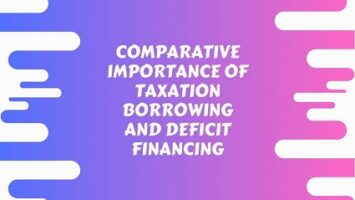Taxes Causing No Diversion:
The following taxes cause no diversion of resources:
(1) Taxes on Windfalls- A tax on windfalls does not cause any diversion of resources, as the income is unexpected, the tax will also be unexpected, and hence, it will not be possible for anyone to shift these resources to some other use.
(2) Taxes on Land Values- The incidence of a tax on the site value of land will be on the land owner, whatever, the use to which the land is put. It does not, therefore, cause any diversion of economic resources, because a shift in the use of land will not shift the incidence of tax. Hence, any diversion of resources is not beneficial to the owner, as the burden of tax remains the same in all uses. The supply of land is perfectly inelastic, i.e. limited and fixed and therefore diversionary effects are not possible.
(3) Taxes on Monopoly- A tax on monopolists may not lead to the diversion of resources, because he fixes his output and price in such a way his profits are the highest, i.e., he fixes the supply of his output at the point, where marginal revenue and marginal cost are equal. If he reduces his production, because of taxation, his profits will decline. And, therefore, he would like the bear the burden of taxation rather than curtail his production. Hence, the resources employed by a monopolist may not be diverted to any other use because of taxation.
(4) Non-Differential Taxes- Dalton pointed out that a tax, which falls with equal weight upon all use of economic resources, gives no inducement to their diversion from present use to some other use, because that diversion would not be profitable, i.e., the diversion of economic resources will not reduce the burden of taxation, as the rate of taxation remains the same for all uses. For example, a general income tax, and an expenditure tax are more or less non-differential in nature.
However, there is some controversy on the point that diversion of resources may take place even when there is equal weight of taxation upon all uses of economic resources, because equal tax rates may affect unequally the supply of taxed commodities, provided the elasticities of their demand or supply are unequal. Hence, the equal tax rate would be differential in its effects. It would divert resources from the production of those commodities whose supply and demand are elastic to those where the elasticity is small.









Comments (No)